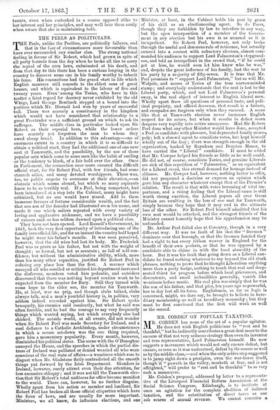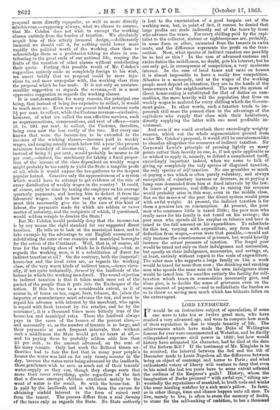MR. COBDEN ON . POPULAR TAXATION.
MR. COBDEN has none of the art of a popular agitator. He does not wish English politicians to " rest and be thankful," but he indirectly contributes a great deal more to the success of that not very arduous strategy than even its inventor and true representative, Lord Palmerston himself. He now suggests a movement which would not only ensure defeat, but ensure, so soon as it was understood, defeat by the masses as well as by the middle class,—and when the only active step suggested is to jump right down a precipice, even the war-horse itself, though it " paweth in the valley, mocketh at fear, and is not affrighted," will prefer to " rest and be thankful " to so very rash a manoeuvre.
Mr. Cobden's proposal, addressed by letter to a representa- tive of the Liverpool Financial Reform Association at the Social Science Congress, Edinburgh, is to institute at once an agitation fur the complete abolition of indirect taxation, and the substitution of direct taxes as our sole source of annual revenue. We cannot conceive a proposal more directly unpopular, as well as more directly mischievous,—supposing always, what we choose to assume, that Mr. Cobden does not wish to exempt the working classes entirely from the burden of taxation. We absolutely acquit him of this utterly immoral design,—deliberately immoral we should call it, for nothing could lower more rapidly the political worth of the working class than to acknowledge them as a proletariat taking no share in con- tributing to the great ends of our national life, reaping the fruits of the taxation of other classes without contributing their quota. Putting this possible result of Mr. Cobden's suggestion entirely aside as completely foreign to his wish, we assert boldly that no proposal could be more inju- rious to, and more unpopular with, the working class than the proposal which he has made. It is not only an unstates- manlike suggestion as regards the revenue,—it is a most oppressive suggestion as regards the working classes. It is unstatesmanlike for many reasons, the principal one being, that instead of being less expensive to collect, it would be much more so. Even now our present inland revenue costs 34 per cent. to collect, while the Customs revenue—exclusive, however, of what are called the non-effective services, such as superannuations, compensations, and rent of offices—costs 31. ls. 10d. per cent. to collect, the Customs, therefore, being even now the less costly of the two. But every one knows that were the income-tax to be extended to the incomes of the working classes,—incomes paid in weekly wages, and ranging usually much below 601. a year (the present minimum boundary of income-tax), the cost of collection, instead of being 3 per cent., would probably be nearer to 30 per cent.,—indeed, the machiuery for taking a fixed propor- tion of the income of the class dependent on weekly wages might probably be too costly to yield the State a tangible profit at all, while it would expose the tax-gatherer to the deepest popular hatred. Conceive only the oppressiveness of a system which would have to attempt to get evidence of the rate of every distribution Of weekly wages in the country ! It could, of course, only be done by taxing the employer on his average quarterly payments, and leaving him to deduct it from the labourers' wages. And to how vast a system of espionage must this necessarily give rise in the case of this kind of labour, the payments made for which are seldom or never matter of notoriety, and the recipients of which, if questioned, would seldom scruple to deceive the State !
But Mr. Cobden would probably deny that the income-tax is by any means the right standard for our suggested direct taxation. He tells us to look at the municipal taxes, and to take example by the advantage to our English commerce of substituting the rates of our counties and municipal boroughs for the octrois of the Continent. Well, that is, of course, all true for the trading class of which he is thinking,—but, as regards the working men, is it a substitution of direct for indirect taxation at all ? On the contrary, both the (imperial) house-tax and the local rates are, as regards the working class, of the very worst kinds of indirect taxes,—taxes virtu- ally, if not quite technically, farmed by the landlords of the houses in which the working men dwell. The sound objection to indirect taxation is that it takes much more out of the pocket of the people than it puts into the Exchequer of the nation. If this be true to a considerable extent, as it of course is, of taxes on tea, sugar, beer, tobacco, &c. (since the importer or manufacturer must advance the tax, and must be repaid his advance with interest by the merchant, who again is repaid with fresh interest by the retailer, and he by the consumer), it is a thousand times more bitterly true of the house-tax and municipal rates. These the landlord always pays in the cases of the houses of the poorest class,— and necessarily so, as the number of tenants is so large, and their payments at such frequent intervals, that without such a middleman the State would get no taxes at all,— and for paying them he probably seldom adds less than 25 per cent., to the amount advanced, on the rent of his many tenants. Only last week the Bethnal Green au- thorities had to face the fact that in many poor people's houses the water was laid on for only twenty minutes in the day, because the water-rates being advanced by the landlords, those gentlemen wish to save as much out of their tenants' water-supply as they can, though they charge rents that more than cover everything, quite regardless of the fact that a disease amongst children attributed mainly to the want of water is the result. So with the house-tax. It is paid by the landlords, and is with them the excuse for obtaining sixfold interest in the form of raised rent from the tenant. The process differs from a real farming of the taxes only as regards the State. No State authority is lent to the excruciation of a good bargain out of the working men, but, in point of fact, it cannot be denied that large profits are made indirectly out of the taxes by those who advance the taxes. For every shilling paid by the capi- talist to the collector, sixteen or eighteenpence are, probably, in some form or other, extracted from the tenants in extra rents, and the difference represents the profit on the tran- saction. Now, what species of indirect taxation can possibly be so bad as this ? In the case of advanced customs and excise duties the middleman, no doubt, gets his interest; but he- can only get, in consequence of competition, a very moderate- interest. In the case of local taxes and rates on houses- it is almost impossible to have a really free competition. Situation is a monopoly, and as the wages of the working people must depend on situation, they are in the hands of the- houseowners of the neighbourhood. The more the system of direct house-rating is substituted- for that of duties on com- modities, the more heavily will the population that lives on weekly wages be mulcted for every shilling which the Govern- ment gains. In other words, such a taxation tends to im- poverish still more the poorest class to the advantage of the- capitalists who supply that class with their habitations, directly supplying the latter with one most profitable in- vestment.
And even if we could overlook these exceedingly weighty reasons, which cut the whole argumentative ground from under Mr. Cobden's proposal, it would still be unstatesmanlike to abandon altogether the resources of indirect taxation. Sir- Cornewall Lewis's principle of pressing lightly on many points rather than heavily on one, is, if not quite applicable as he wished to apply it, namely, to defend a complicated tariff, exceedingly important indeed, when we come to talk of- giving up completely the only species of disguised taxation,. the only species of self-taxation. No one grumbles so much at paying a tax which is often purely voluntary, and always susceptible of voluntary increase or decrease, as at paying a lump sum demanded from him at fixed intervals by the law. In times of pressure, real-difficulty in raising the revenue- would probably arise in this way, even in the middle class. But on the masses. of the poor the direct system would press with awful weight. At present, the indirect taxation is for- them a genuine tax on consumption. At present, the poor man who consumes little is taxed little ; the poor man who really saves for his family is not taxed on his savings ; the poor man who spends all his surplus on tobacco and beer is taxed to the full amount on his expenditure. To substitute- for this tax, varying with expenditure, any form of fixed deduction from wages,—even were that possible,—would not only increase the consciousness of pressure, but would heavily increase the actual pressure of taxation. The frugal poor would be taxed not only on their indulgences and necessaries, but equally on their indulgences, necessaries, and savings, or,. at least, entirely without regard to the scale of expenditure. The sober man who supports a large family on 15s. a week would be taxed far more than now ; the drinking and smoking man who spends the same sum on his own indulgences alone would be taxed less. To sacrifice entirely the facility for self- taxation which taxes on commodities necessarily give, and alone give, is to double the sense of grievance even on the same amount of payment,—and to redistribute the burden so. as to throw on saving men much which has hitherto fallen on the extravagant.































 Previous page
Previous page